We’ve all seen them – social media blunders. Those tweets and posts forever remembered by being so bad, they can ruin the reputation of the brand associated. For a companies with huge social media teams and PR personnel running around, the fall-out can be sometimes minimized. But for a small business diving into social media marketing, it could be a catastrophic mistake that costs you revenue when you need it the most.
Here are the 12 things that you should never (I Mean NEVER) post on your brand’s social media accounts.
1. Political Views
This is first on our list because it can seemingly be the most damaging on social networks. No matter your feelings or ideals, it’s best to keep them to yourself or at best, on your personal and protected social media accounts.
Just ask Dan Cathy. The owner of Chic-Fil-A tweeted what he likely thought was an innocent statement about his belief in tradition family values. What ensued was a hail storm of backlash from the public and gay rights activists, and even today it seems that a chicken sandwich can be viewed as a political statement.
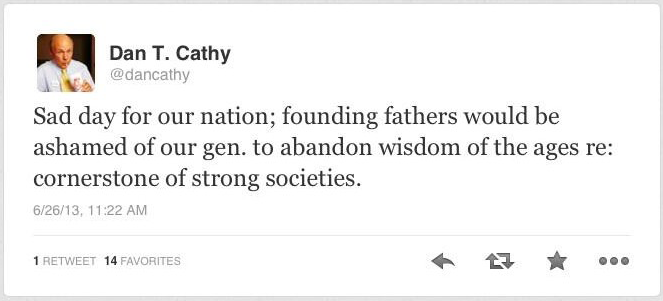
2. Questionable Humor
Sometimes the things that go through our minds shouldn’t go out our mouths – or our fingers. Kenneth Cole launched a new spring line. People started a rebellion in Cairo. Social media managers with @KennethCole told us that “millions are in uproar in #Cairo. Rumor is they heard our new spring collection is now available online.” Sometimes it’s better to think a few times before you tweet.
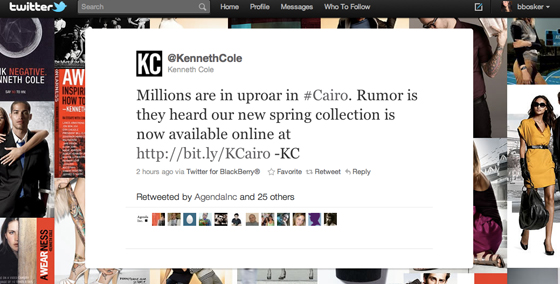
3. Inappropriate Comments
The old adage about not saying anything if you don’t have something nice to say is especially true in social media. Remember that even if you delete a tweet, it’s likely too late and the damage has already been done. I always remind people of the phrase “Say it, forget it – Write it, regret it” when it comes to borderline tweets and Facebook posts. If you’re not sure if it will come across as inappropriate or not, it’s best to leave it off your timeline.
4. Thoughtless News Jacking
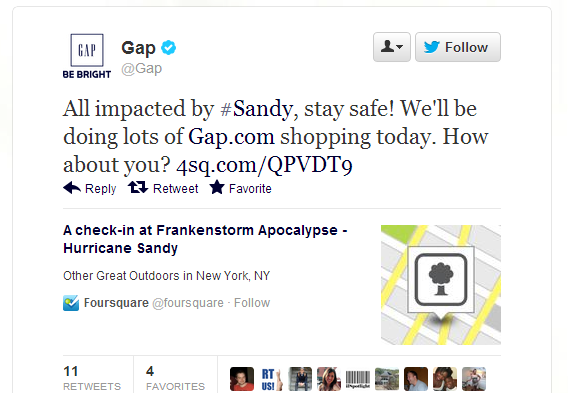
5. Snarky Remarks
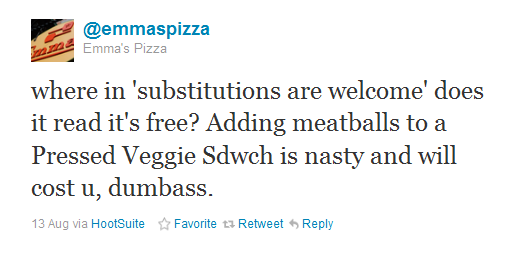
6. Rude Comebacks
It can be tempting to reply to a negative review or comment with a rude comment or two of your own. Keep in mind that this is just fuel for the fire, and is never a productive solution. For more tips on dealing with a negative online review or comment, read this recent post on how to Handle Negative Reviews online.
7. Canned Answers and Responses
I see a lot of businesses that have two or three canned responses in a notepad and use them to answer and reply to all of their comments and mentions. This is a bad idea. The whole premise of social media is to be “social” and to engage people, so show your human side and actually engage with your followers.
8. Spammy Sales Tactics
Toyota has created a lesson for us all. They started a campaign during the Super Bowl to have users tweet messages about #camryeffect. The moment someone tweeted using the hash tag, they received a spammy automated message about a contest. Eventually, Twitter suspended the account for spam. Toyota might not be the image that comes to mind when hearing about a spammer, but even good companies can go bad with the right intentions.
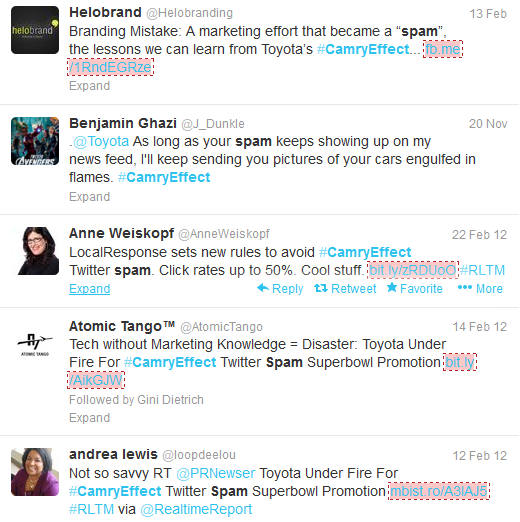
9. Hashtags Open to Interpretation
Last year, Digiorno’s Pizza inappropriately tried to use the Twitter hashtag #WhyIStayed – The hashtag initially caught fire when regarding the Ray Rice domestic violence issue, and the fact that his now wife Janay Palmer Rice decided to stay with the NFL Running Back. Digiorno’s attempted to join the conversation with ” #WhyIStayed – You had pizza.”
Within minutes the tweet was removed and the company tweeted an apology, citing that they were not aware of the hashtags context before sending the tweet.
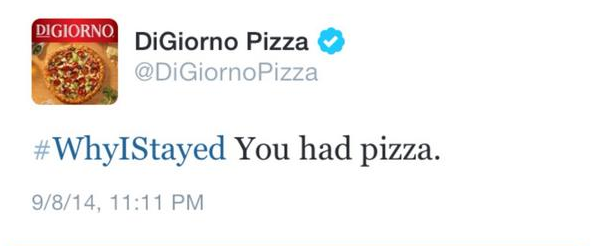
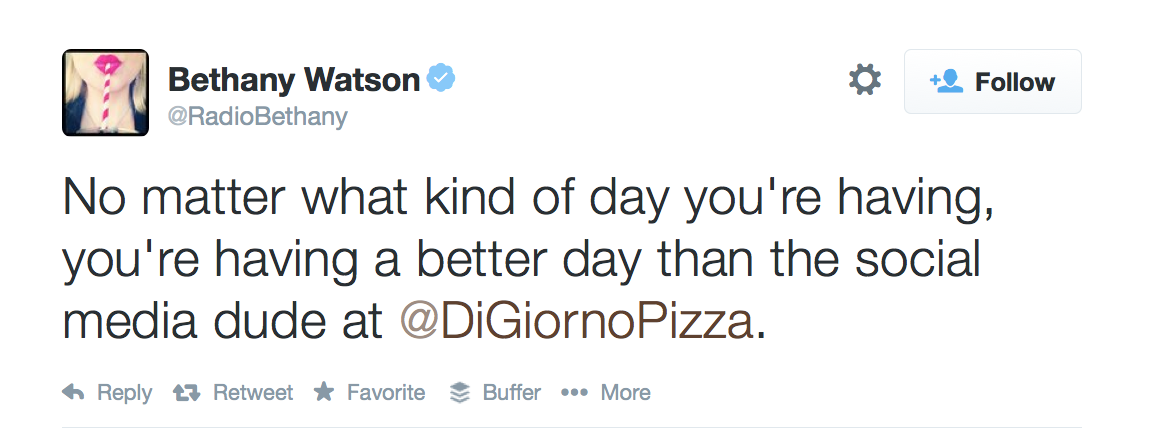
10. Rants
In what is seemingly the biggest Social Media ranting blunder of all time, Amy’s Bakery lashed out at reviewers, customers, and staff one day, using some pretty choice words on their Facebook page. A meltdown if ever there was one, this is a perfect example of why you should keep your rants off of your social media accounts, and avoid the temptation to let your inner “meltdown” run wild for the world to see.
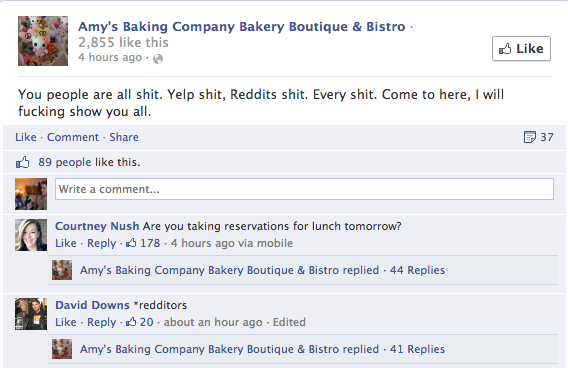
11. Criticizing Your Competitors
This applies both on and off social media, but especially on. When you criticize your competitors, it doesn’t make them look bad, it makes you look bad. And tweeting or posting something negative about a competitor will certainly come back to bite you at some point. It’s best to keep these to yourself.
12. Stolen Content
The worst thing you can do on the web is to steal someone else’s content and branding it as your own. This pretty straight forward, and if you’re going to share something that someone else has created or written, just give them credit or retweet their name with the article. It’s only fair, and it’s good social media etiquette.
We’ve all seen them – social media blunders. Those tweets and posts forever remembered by being so bad, they can ruin the reputation of the brand associated. For a companies with huge social media teams and PR personnel running around, the fall-out can be sometimes minimized. But for a small business diving into social media marketing, it could be a catastrophic mistake that costs you revenue when you need it the most.
Here are the 12 things that you should never (I Mean NEVER) post on your brand’s social media accounts.
1. Political Views
This is first on our list because it can seemingly be the most damaging on social networks. No matter your feelings or ideals, it’s best to keep them to yourself or at best, on your personal and protected social media accounts.
Just ask Dan Cathy. The owner of Chic-Fil-A tweeted what he likely thought was an innocent statement about his belief in tradition family values. What ensued was a hail storm of backlash from the public and gay rights activists, and even today it seems that a chicken sandwich can be viewed as a political statement.

2. Questionable Humor
Sometimes the things that go through our minds shouldn’t go out our mouths – or our fingers. Kenneth Cole launched a new spring line. People started a rebellion in Cairo. Social media managers with @KennethCole told us that “millions are in uproar in #Cairo. Rumor is they heard our new spring collection is now available online.” Sometimes it’s better to think a few times before you tweet.

3. Inappropriate Comments
The old adage about not saying anything if you don’t have something nice to say is especially true in social media. Remember that even if you delete a tweet, it’s likely too late and the damage has already been done. I always remind people of the phrase “Say it, forget it – Write it, regret it” when it comes to borderline tweets and Facebook posts. If you’re not sure if it will come across as inappropriate or not, it’s best to leave it off your timeline.
4. Thoughtless News Jacking

5. Snarky Remarks

6. Rude Comebacks
It can be tempting to reply to a negative review or comment with a rude comment or two of your own. Keep in mind that this is just fuel for the fire, and is never a productive solution. For more tips on dealing with a negative online review or comment, read this recent post on how to Handle Negative Reviews online.
7. Canned Answers and Responses
I see a lot of businesses that have two or three canned responses in a notepad and use them to answer and reply to all of their comments and mentions. This is a bad idea. The whole premise of social media is to be “social” and to engage people, so show your human side and actually engage with your followers.
8. Spammy Sales Tactics
Toyota has created a lesson for us all. They started a campaign during the Super Bowl to have users tweet messages about #camryeffect. The moment someone tweeted using the hash tag, they received a spammy automated message about a contest. Eventually, Twitter suspended the account for spam. Toyota might not be the image that comes to mind when hearing about a spammer, but even good companies can go bad with the right intentions.

9. Hashtags Open to Interpretation
Last year, Digiorno’s Pizza inappropriately tried to use the Twitter hashtag #WhyIStayed – The hashtag initially caught fire when regarding the Ray Rice domestic violence issue, and the fact that his now wife Janay Palmer Rice decided to stay with the NFL Running Back. Digiorno’s attempted to join the conversation with ” #WhyIStayed – You had pizza.”
Within minutes the tweet was removed and the company tweeted an apology, citing that they were not aware of the hashtags context before sending the tweet.


10. Rants
In what is seemingly the biggest Social Media ranting blunder of all time, Amy’s Bakery lashed out at reviewers, customers, and staff one day, using some pretty choice words on their Facebook page. A meltdown if ever there was one, this is a perfect example of why you should keep your rants off of your social media accounts, and avoid the temptation to let your inner “meltdown” run wild for the world to see.

11. Criticizing Your Competitors
This applies both on and off social media, but especially on. When you criticize your competitors, it doesn’t make them look bad, it makes you look bad. And tweeting or posting something negative about a competitor will certainly come back to bite you at some point. It’s best to keep these to yourself.
12. Stolen Content
The worst thing you can do on the web is to steal someone else’s content and branding it as your own. This pretty straight forward, and if you’re going to share something that someone else has created or written, just give them credit or retweet their name with the article. It’s only fair, and it’s good social media etiquette.
Published on July 21, 2015

